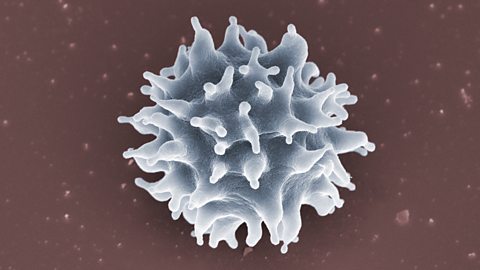Lymphocytes

Lymphocytes are the white blood cells involved in the specific immune response. They recognise specific antigenAntigens are molecules, often proteins, located on the surface of cells that trigger a specific immune response. on invading pathogenMicroorganisms that are harmful to humans.. Antigens are molecules, often proteins, located on the surface of cells that trigger a specific immune response.
Lymphocytes detect that the proteins and pathogens are foreign - not naturally occurring within the body - and produce antibodyA protein produced by the immune system in humans (and other animals) that attacks foreign organisms (antigens) that get into the body.. This can take a few days, during which time you may feel ill.
The antibodies created by the lymphocytes cause pathogens to stick together and make it easier for phagocytesCells, such as white blood cells, that engulf and absorb waste material, harmful microorganisms, or other foreign bodies in the bloodstream and tissues. to engulf them.
Each lymphocyte produces its own specific receptor that corresponds to a specific antigen. When a lymphocyte encounters that antigen it multiplies, creating large numbers of identical lymphocytes bearing that particular receptor.
Some pathogens produce toxinA type of natural poison produced by an organism, often as a form of protection. which make you feel ill. Lymphocytes can also produce antitoxinAn antibody produced by white blood cells. It can neutralise toxins. to neutralise these toxins. This means that the toxins cannot bind to body cells and cause damage.
Antibodies and antitoxins are highly specific to the antigen or toxin that is made by the pathogen. That is why we say that the lymphocytes that produce them are specific.
There are two types of lymphocyte:
- B lymphocytes
- T lymphocytes